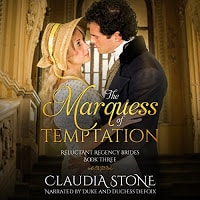My rating: 3 of 5 stars ⭐⭐⭐
Duration: 14 hrs 20 mins.
#BennetSistersScale: Kitty - 🌹🌹🌹 Just like the second-youngest Bennet, this trilogy displays traits borrowed from all the sisters. Though the general tone across the series has the trademark sweetness of a Jane, it is easily led astray in places.
Reluctant Regency Brides Collection, Books 1 - 3 by Claudia stone is a sweet trilogy of interlinked romances, setting hearts aflutter from the great townhouses of Regency London to the sweeping estates that pepper the Cornish coast.
As soon as I opened this audiobook to begin playing it, I was delighted to see that it utilises Audible chapter headings! This meant that I knew exactly how much of each book was remaining, making it easier to switch between audiobooks rather than bingeing them all in one go. I've been nagging Audible about this feature for years and it has slowly started to roll out, but this was the first multiple-book collection I've listened to that made use of it. Alongside an elegant cover, it was off to a good start!
I knew the characters in this series were likely to be well observed because I always enjoy Claudia Stone's storytelling, and she writes compelling characters who are often easy to get to know. The series as a whole could benefit from tighter editing in places, and there are some unfortunate missteps, but overall it was a sweet, fun, and romantic listen.
As this is a three-book collection, and they are still also available as standalone novellas, I'll review each one in turn below, with my thoughts on the narrators, Duke and Duchess DeFoix, at the end.
Note: I have slightly edited the summaries of each book to reduce spoilers, but skip the summaries if you'd rather not know too much about the characters in advance, as they do give quite a lot away.
Rating: ⭐⭐⭐
Main tropes: Enemies to Lovers, Secret Identity.
Summary of Book #1 "Rumors abound that the Sixth Duke of Everleigh callously murdered his late wife and killed her lover in a duel - and now Olive is to become his bride...
Ruan Ashford took one look at Olive Greene and knew that he had to have her in his bed. The beautiful, auburn-haired temptress will make a perfect Duchess; there's only one problem - his new wife despises him.
Soon, the Duke of Ruin is hunting the Cornish countryside for his runaway bride. Can he convince her that he's not the dreadful villain the world thinks him to be?
©2017 Claudia Stone (P)2018 Claudia Stone."
The couple's connection was passionate and steamy, the story was intense and dramatic at times and charming at others. For a while it felt very much like St Jarvis were being set up as a similar 'bluestocking's retreat' to Tessa Dare's infamous Spindle Cove, but it featured less heavily in the later books in this series.
I liked Olive's spark, but the Duke's passion and intensity were the most compelling aspect of this story for me. I was a little disappointed that the intimacy which was bubbling so nicely throughout was glossed over, as it was a shame for such a fiery couple to go out with a whimper rather than a bang. I would also have preferred to see more of a build-up before the card game as the arrangement it led to felt rather abrupt, but they were well matched, and their story was a great way to kick off the box-set.
I chuckled at the line "They wanted passive, compliant wives; not one with spirit. Spirit was what one looked for in a horse." Though it is rather unfortunate that the main regard in which society has changed is that it is now less commonplace to have a horse...
There were a couple of things that stuck out as being a little unfortunate, but none of the errors were too egregious.
The first was that procuring a Special License from the Archbishop of Canterbury would have been far more difficult than is suggested here. Very few were issued and given the Duke's reputation I doubt he would have been granted an audience. Creativity often circumvents historical accuracy, and in this case a Common License would have been a barrier to the immediacy of the marriage, so only a Special License would achieve that objective. Even so, a Special Licence seldom sped up the process quite as much as it did for Olive and the Duke, as even the infamous Lord Byron had to wait almost a full sennight for his Special License. In reality, it would have been nearly impossible for the couple to marry in such haste without hot-footing it to Scotland.
Contrary to popular belief, annulments were also difficult to obtain, and non-consummation was not one of the reasons for which it could be sought. The confusion seems to stem from the fact that impotence could be used as a reason for annulment, but not without the greatest humiliation for both parties. The wife's intact innocence and the husband's inability to become aroused by any woman had to be proven in the ecclesiastical court, following lengthy and degrading processes (which are laid out in fascinating detail in Allison Lane's list of Common Regency Errors.)
Accuracy aside, there was also some very anachronistic language, particularly when Ruan was contemplating his friend, Lord Devereux's disdain towards Jane in their youth as "the natural emotion that a teenage boy would feel for his younger sister". The notion of a 'teenager' would not exist for another century. (This modern language is also present in the later books, with "sulky teens" and "teenage boys" appearing in the second.)
There was also an unfortunate 'Americanism', in the form of the word "posies" used as another word for individual flowers. Ruan "standing at the door with a bouquet of posies" sounds very odd to a British listener, and would have been exceedingly so in the Regency period. Whilst 'posy' does refer to flowers, in British English it is specific to a small bouquet, corsage, or modest bunch of flowers, not the flowers themselves. One might arrive at a lover's door clutching a 'small posy of flowers', but not a "bouquet of posies".
These niggles aside their story was a good one, and I was rooting for them from early on in their tale, which also sets the next book up well.
Rating: ⭐⭐⭐
Main tropes: Pretense Becomes Reality, Friends to Lovers, Bluestocking and a Rake.
Summary of Book #2: "Miss Jane Deveraux is in a bind; her brother has married and his new wife does not want her bookish sister-in-law encroaching on their wedded bliss. The Viscountess makes it very clear that Jane must find a husband, but the confirmed spinster doesn’t have many suitors lining up to claim her hand.
What Jane needs is a large sum of money, so that she can buy the local boarding house, and live out her days holding intellectual saloons for the egalitarian set. Though where she’ll find this money is anyone’s guess…
James Fairweather, Lord Payne is the heir to the Ducal seat of Hawkfield. Tall, handsome, and with a roguish charm that has women falling at his feet, he should be living the easy life of an entitled bachelor. [But] his father has tired of his rakish ways. What Payne needs is a respectable woman that he can parade around for a season to convince his father that he has changed. The only person who fits the bill is his friend’s sister, Jane, who reluctantly agrees to go along with the charade - for a price. When the Lord of Heartbreak finds himself falling in love with the clever, bookish young woman, he realizes that he’s very much at risk of having his own heart broken.
©2018 Claudia Stone (P)2018 Claudia Stone."
James and Jane are an unlikely pairing at first, but slowly we come to see that sometimes opposites really do attract, and James' kind heart is worth more than others' cool intellect. It was nice to listen to a Regency story about a hero who isn't afraid to be warm and friendly. Lord Payne is like a Labrador puppy, full of bubbly exuberance and mischief. His sister, whose name I am unsure of as the narrators seemed unable to agree upon whether it was Carolyn or Caroline, was also a great character. In fact, the whole Payne family were interesting, and I would enjoy hearing the backstories for any of them.
I was glad that Jane ultimately found the support she had been lacking without having to change. Simple things like being able to wear her glasses around James and his family gave her back the dignity that was incrementally stripped by her brother and his wife.
They may not have had the most dramatic romance, but I felt that their affection for each other would endure long past the first flush of love.
Rating: ⭐⭐⭐
Main tropes: Secret Identity, Guardian and Ward.
Summary of Book #3: "Since her father’s death, Miss Hestia B. Stockbow has been living a lie. Working as a companion, under an assumed name, all she wants to do is keep her head down and forget about the scandalous tragedy that haunts her past. There’s only one problem…
The usually icy and aloof Alexander Delaney, Marquess of Falconbridge, finds himself entranced. When he discovers [her true identity], Alex realizes there's only one thing he can do... [But] Belinda has absolutely no desire to wed the cold Lord Delaney - and she’s not the type of lady to take orders from anyone; even a Marquess.
©2018 Claudia Stone (P)2018 Claudia Stone."
I was looking forward to this story as the characters have prominent roles in the second book, but it was rather a confusing start, for Falconbridge has an Irish accent in the previous book which has disappeared in this one. That lack of continuity is made more glaring now that all three books are packaged into a boxed set. As the narrators remained the same throughout the series, it suggests that they either failed to cross-reference their previous work, or the author intervened because the previous portrayal was incorrect. Either way, the result is that his character feels completely different in this book, and it undoes all the work that was put into introducing him in the previous story. In fact, his character seems markedly changed in Book 3, with no hint in Book 2 of the man "the papers called The Marquess of Temptation", which is odd as the stories take place simultaneously (whereas Books 1 and 2 are concurrent in their chronology).
I also found it very unsettling and distracting that the gallant Alex's name was inspired by a notoriously bumbling incompetent; Boris Johnson. The latter being named Alexander 'Boris' de Pfeffel Johnson, and Falconbridge's full name given a couple of times as "Alexander Jack de Pfeffel Delaney". Even if you agree with Johnson's politics, it cannot be reasonably argued that a man who has actively misled the Queen possesses any of the honour one expects from a Regency hero. (It does, however, make the error regarding his accent seem much more in-keeping.)
However, Alex became one of my favourite heroes from this box-set, despite the shaky start. I would have loved a full-length novel from his perspective, including more of his past and his work deciphering codes and hieroglyphics. Hestia was a little bland in comparison, but that may also be because the previous two heroines were rather more robustly drawn, with very a very definite sense of self to each, whereas she was most notably referred to as "delicate".
There was one anachronistic incongruity that stuck out a little, though I think it is minor enough to go unnoticed by most. When it was stated that Hestia was being sent away "with Lady Bedford's trusty Cavalier" it took me a while to realise they were talking about a dog! I wasn't sure that they would have been known as Cavalier's in the early 19th Century, however, so checked with the Cavalier King Charles Spaniel Club, who have written a fascinating and very thorough history of the breed. In short, the breed has only been known as a Cavalier King Charles Spaniel since 1928, more than a century after the Regency era came to an end. Prior to that, the dogs were simply Toy Spaniels which became known as King Charles Spaniels, after the monarch who popularised the breed and elevated their status. Today, King Charles Spaniels (KCS) retain the domed features that became fashionable in the 19th Century, and Cavalier King Charles Spaniels have been bred back to look more like the dogs that so delighted the King who gave them his name. It is the little tidbits of information of this kind that bring history alive for me, and I enjoyed learning the difference, though I do think that poor Henry would have preferred to be a longer-nosed Cavalier KCS, for it would have been far easier to race off and snaffle picnic food than he will now find it, with the stubbier snout and shallower breathing of a standard KCS.
I was glad to see Captain Black return from the first book, especially with the promise that he may well have a story of his own that will be told shortly.
Hestia and Alex's story was more complex than Jane and James', but sweeter than that of Olivia and Ruan. Theirs was the perfect tale on which to leave the residents of St Jarvis. For now...
The narrators, Duke and Duchess DeFoix, worked well together. I preferred Duke's narration, as it felt more natural and less affected. His voice has an appealing depth and richness, and his accent contains all the easiness that Duchess' lacks.
Duchess has a pleasant voice and is a confident, enthusiastic narrator but her performance is hindered a little by the fact that she is, rather obviously, not reading in her native accent. The voice she gave Jane Devereux was bright, lively, and more natural, and was my favourite of Duchess' character voices. Almost all of her character voices (except Polly Jenkins' oscillating accent) were very good, it was just the exaggerated narrative style in between sections of dialogue that was not as enjoyable.
The tendency some American narrators have to read very slowly with exaggerated enunciation when attempting a 'BBC RP' accent, particularly for historicals, always takes a while to settle into. Speeding up the narration to 1.20x improved the pacing of Duchess' chapters considerably and helped it feel a little less 'put on'. The increased speed did not suit Duke's narration, and it would have been a shame to speed through it, so I resigned myself to juggling the speed between chapters. This was annoying but less so than listening to either of them on the wrong seed for their delivery.
There were a few mispronunciations throughout, most notably the odd inconsistency with James' sister's name. I also thought toMAYto/toMAHto was such a well-known transatlantic variation that it wouldn't still appear incorrectly, but it snuck in anyway. "Ratafia" was incorrectly pronounced as ra-TAAH-fi-a instead of rat-a-FI-a by both narrators throughout.
An interesting, though rather more archaic, pronunciation issue came with the insult "black guard". Whilst there are various different theories surrounding the etymological origins of this disparaging term - historically often reserved for a man who has mistreated a woman - it is actually pronounced 'blaggard'. (People often do not realise that they are the same word; being either familiar with it in its written form in historical fiction or hearing it in historical dramas, but seldom connecting the two.) You can see how the natural contraction would happen, especially as it is no endearment and was often uttered in disgust at heated moments. There's an interesting thread on the history of the word over at StackExchange if you fancy reading more about its origins.
An interesting, though rather more archaic, pronunciation issue came with the insult "black guard". Whilst there are various different theories surrounding the etymological origins of this disparaging term - historically often reserved for a man who has mistreated a woman - it is actually pronounced 'blaggard'. (People often do not realise that they are the same word; being either familiar with it in its written form in historical fiction or hearing it in historical dramas, but seldom connecting the two.) You can see how the natural contraction would happen, especially as it is no endearment and was often uttered in disgust at heated moments. There's an interesting thread on the history of the word over at StackExchange if you fancy reading more about its origins.
Having recently listened to masterfully narrated Regency romances with solo male narrators, I would very much like to hear Duke DeFoix record a full novel alone. I much preferred his chapters, and given the personality he infused into all the male characters - and their recognisable accents - I'm sure he'd have a serviceable enough go at portraying the women equally as colourfully. He did well with the elderly lady at the boarding house, and I think that a Regency told mostly from the hero's perspective would suit his voice nicely.
Overall I enjoyed this trilogy of love stories despite the missteps, because Claudia Stone's characters are always interesting enough to hold their own, and the romances are lighthearted but filled with affection. I will keep an ear out for other Regencies by Claudia Stone, and my fingers crossed that perhaps one day Duke will get a more prominent role in their narration.
















No comments